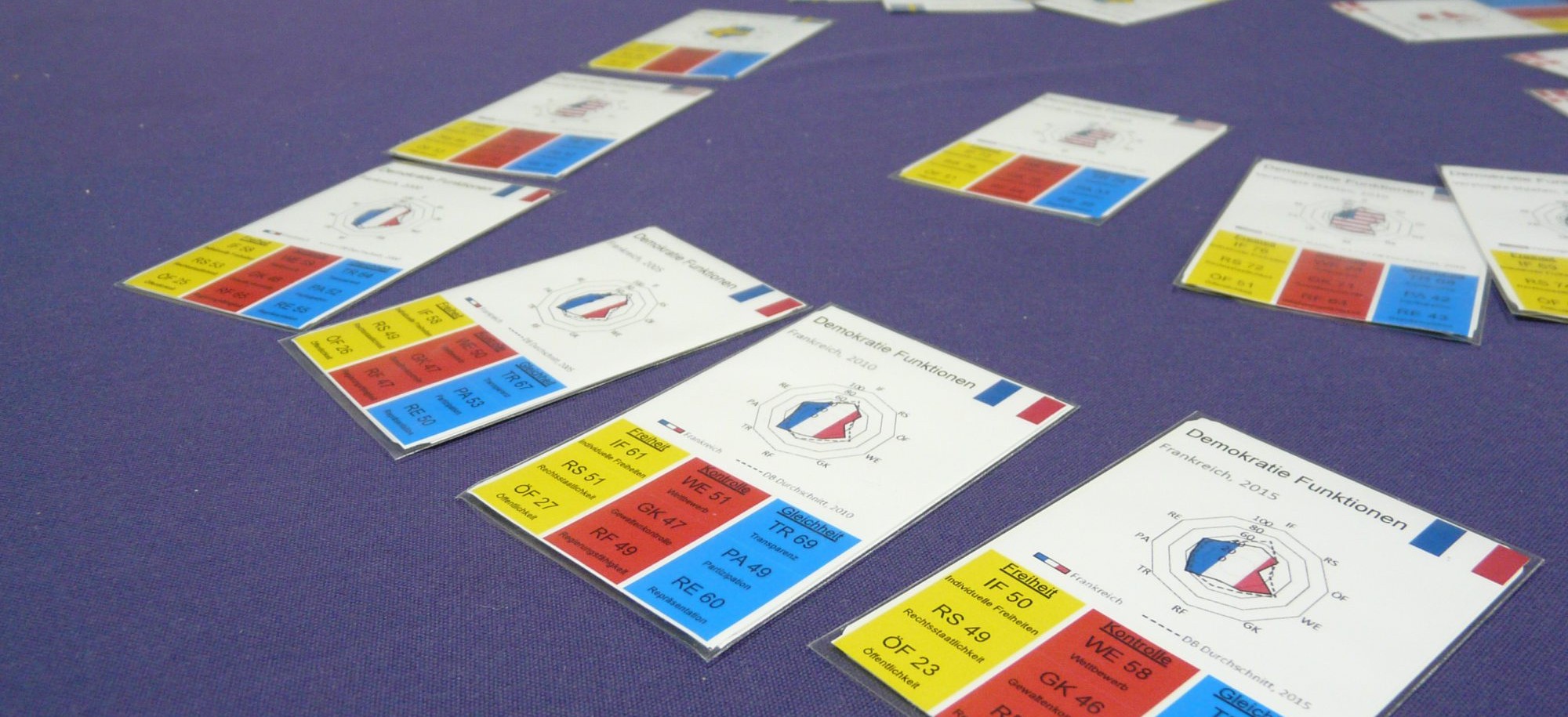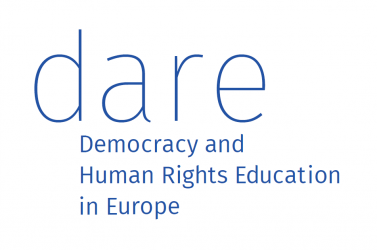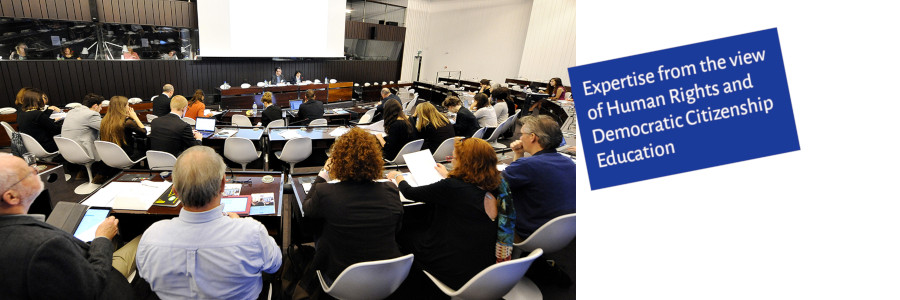- ET2020 Strategic Framework for European Cooperation in Education and Training
- Referred Document: PDF
Becoming an active citizen and an agent for an inclusive society is a lifelong task and a transversal competency. The problems we face in Europe are all-generation problems. Activities that aim for a significant impact have to take this into account. Beyond a youth empowerment strategy we need more activities that address the values of democratic life overarching all societal groups. The promotion of civic competences is an issue which relevant for all fields of EU policy making: thus an integrated approach which aims to mainstream Education for Democratic Citizenship (EDC) and Human Rights (HR) in Europe is needed.
- Best practice and experience from all European programs should be made more cohesive.
- Adults learning needs more competency based democratic citizenship education tools.
Shaping Impact Oriented Learning Processes
Civic Competence is formed in a wide, heterogenic learning space and therefore characterized through an assembly of different learning experiences. They need to be connected in a consciously designed learning process. The more these different learning opportunities complement each other the more the learning process becomes efficient and sustainable.
Such processes can be designed in formal and non-formal learning environments. They combine group interaction and learning, self-experiencing, cognitive learning, opportunities for informal learning and reflection.
The experience of active involvement and the development of an involving attitude are shaped in all spaces of life. Therefore Education for Democratic Citizenship has a very practical role. Likewise to vocational education it requires a balance of practice, reflective observation and knowledge transfer.
The supporting mechanisms are asked to reflect on this by
- supporting conscious designed educational processes that involve the combination of a lot of different experience instead of a lot of single learning activities
- making practical experience of beneficiaries a precondition
- enabling youth to experience democracy in all spheres of education as holistic experience: Formal and non- formal educational providers have to be adequately supported and equipped in order to gain subsequent results
- formal and non-formal educational providers and their facilitators/trainers need to be clear that they share a responsibility for democracy in Europe. We need to be clear to follow democratic principles and to contribute to strengthen the rights and capacities of the learners.
Towards an Advanced Definition of Innovation in EDC
The 2015 Joint Report on EAT 2020 is mentioning as a main challenge for determining the choice of future priorities, the “sustainable investment,quality and efficiency of education and training systems”. Therefore we emphasize from the perspective of EDC that the quality and efficiency is mainly measurable in the sum of the beneficiaries’ independent, self-responsible democratic involvement in state, civil society or as democratic employees. Innovation in the field of EDC “equips individuals to participate in an effective and constructive way in social and working life and enables people to meet the challenges of the 21 century”. Other than the Joint Report 2015 on ET 2020 in section 2.1. we ask to mention explicitly the “Social and civic competences” as a specific pillar of the EU key competence approach.
In this regard we suggest to characterize innovation in the field of EDC as follows:
- innovation leads to a better quality of participation in educational institutions (schools, organizations or any societal groups).
- innovation broadens and scales up good practices which increase the quality of participation in societal decision making
- innovation links participative experience with the transversal competences one gains during the process of active involvement in the society in a holistic and reflective way.
- innovation improves and exploits knowledge and skills about political participation in society in a sustainable way
Generating local impact as component of the EU policy agenda in EAT
DARE supports the emphasis on „encouraging dialogue and cooperation among all the education stakeholders“. From an educational perspective this goes far beyond parents, schools and teachers, who definitely have a say but are also in a conflictive role when it comes to democracy and diversity learning. As citizens we experience learning about inclusion, democratic values and the positive self-experience in learning settings rooted in and connected to everyday life.
Citizenship Education often is connected to the experience of democratic involvement on the local or closer living environment level (see the COE revised charter on the Participation of young people in local life). However the existing European funding mechanisms of Erasmus+ and other programs make European cooperation to the decisive criteria for funding. This leads to leveling up the European cooperation while energy to gain concrete local impact lacks. As a consequence the projects tend to remain and get lost in the European bubble.
There is a tendency for large scale European cooperation in the education and training field which tends to become dissemination of practices in pre-defined policy areas while not taking in account the concrete conditions on the local/national level. Therefore DARE suggest the ET 2020 funding instruments to spread out to the level of local cooperation systemically. Coalitions and partnerships for youth (and adults) need local embedding and local acceptance. Also they require a broader discussion and exchange of practice to enable actors to evaluate good practice, to scale it up and to make innovation accessible within their local environment.
Since every environment in the European societies is unique in its diversity, principles and ideas of civil involvement, we should respect this diversity. The common ground for all activities is the value basis of the COE European Charter on Democratic Citizenship and Human Rights Education. Therefore any activity must credibly follow and apply the principles of Human Rights, pluralism, democracy and diversity.
- The EU needs to enforce member states to their responsibility for such a collaborative understanding of EDC targeting at improving democratic interaction from the local levels
- The EU needs to set incentives for member states to revise educational frameworks accordingly and install support and monitor mechanisms
- The EU could inshrine in financing mechanisms such as Erasmus+ a Local-European-Partnership-Principle which allows to creating more impact on the local level and at the same time enables for trans- local evaluation and innovation.
Concretely we propose that 60-50% of Education and Training grants might be foreseen for local cooperation between any education field and education and those actors that are relevant in the concrete environment of the target groups. This would allow for real change, target groups benefit from the sources in the best way. Local partnerships open the chance, to develop lasting democracy learning settings. The experience from dozens of successful EU funded projects in the field of CE is, that after the fund ends there is no local, regional money stepping in – so all the capacity and expertise developed gets lost.
40-50% of the grants should be foreseen for innovation and exploitation on partnerships on a trans-local or European level. These sources could empower actors to access innovation, to reflect their impact and to open up new perspectives for their situation. The European character of the partnerships would focus on innovation, scalability and dissemination.
Recommendations for following the priorities of the 2015 joint report on ET 2020
In this paper we mentioned aspects relevant for the Post-Paris Process regarding Democratic Citizenship Education, the qualities and roles of non-formal education, and how we may collaboratively generate more impact when it comes to the goal of self-responsible participation of the end-users / beneficiaries in the society. Comparing our perspective with the Joint Report on ET 2020 released 2015 we see the need for completion and improvement in the following fields.
Priority Area 1
(Relevant and high-quality knowledge, skills and competences developed throughout life-long learning, focusing on learning outcomes for employability, innovation, active citizenship and well-being)
The report EU should aim to raise more awareness on: Enabling actors to develop more complex concepts for empowerment, to better combining experiences inside and outside school or job with experiences as an active citizen.
Priority Area 2
(Inclusive education, equality, equity, non-discrimination and the promotion of civic competences)
The LLL-social and civic competences must be guiding principles for developing policies.
Concretely add the priority: Enhancing democratic action as citizens and promoting social and civic competences.
Priority Area 3
(Open and innovative education and training, including by fully embracing the digital era)
A dimension oriented on local-impact should guide the agenda: Fostering cooperation between different educational providers, state levels in partnerships for active citizenship.
Innovation is not a synonym for the use of media in any learning environments. Innovation regards to EDC should aim to include and transfer innovation in educational approaches especially empowerment concepts and those targeting at the ability of critical thinking, but also by the use of Innovative and active pedagogies for fostering and empowering self-responsible participation of the target groups as active democratic citizens. This can include any digitally supported learning environments.
Priority Area 4
(Strong support for teachers, trainers, school leaders and other educational staff)
DARE underlines the need for supporting the development of key competency related, holistic and cross- sectoral empowerment approaches
DARE underlines the need to support teachers and educators in other forms of evaluation and assessment of Citizenship Education (CE) and learning, which aim at identifying CE-related skills and competences from the post-perspective
Priority Area 6
(Sustainable investment, quality and efficiency of education and training systems)
DARE recommends the EU to outline the need for lasting infrastructural investments in formal and non-formal education on all levels, for adequate resources and reporting mechanisms. Education is the stronghold of democracy in Europe as such more funds need to be allocated to it.
DARE suggests to add to the priority areay to strengthening non-formal education through a Local-European Partnership Principle by linking good practice and innovation on a European level with deeper impact on the local level.
Exploring Success Conditions – more investment in evidence based policy making and more research
The EU Commission should reflect the relevance and importance of non-formal educational providers in Citizenship education more and better with the aim to collect valid data about success conditions for non-formal education for democratic citizenship of young people. Almost all data and research available for education is targeted at formal education, while the levels of youth work, anti-discrimination policies and neighboring fields are not investigated systematically
The impact and experience of non-EU supported public (and other) donors, NGOs or local activities for Citizenship Education needs to be deeply explored by new and better research. It would be highly important to bring more pedagogical research on child development, on EDC programs with young people and other to the EU level. So far only few researches qualify for the EU debate mostly due to language barriers and to a lack of financial support for translation of research and academic debate which is stuck on the national level. Thus the European policy programming on EDC policies builds on a far too small basis of scientific evidence.
The 2015 joint report on ET 2020 indicates this lack of data. At no place there are any qualitative statements regarding the state of citizenship education in Europe or the state of civic attitudes and skills within the European countries. The 2016 issued overview of education policy developments in Europe following the Paris declaration of 17 March 2015 “Promoting citizenships and the common values of freedom, tolerance and non-discrimination through education” confirms this dilemma by collecting mostly (to some extent old) programs from the field of formal education and school. If the European Commission wants to work seriously on the goal for strengthening democratic communities and the active attitude towards citizenship, we need better data and an open debate on success criteria based on better studies.
Opportunities for the EU to proof the state of affairs regards Citizenship and Democracy Education with young people in Europe are the following reporting mechanisms:
- A clear mandate for Eurydice to conduct quality research that goes beyond Educational ministries reporting mechanisms and has a holistic look at CE in the dimension of Educational policies, youth policies, fundamental rights policies in the member states
- An inclusion of the EDC dimension in the European Youth report
A quality contribution by reviewing EDC dimension of the programs Erasmus+ and EU for Citizens on occasion of the COE charter on EDC/HRE review process in 2017 - A European module on the ICCS 2016
- A perception of EDC also in the dimension of youth work and fundamental rights work as fields of Vocational Education and Training (VET)
- The development of quality indicators for the member states to independently assess and monitor their policy mechanisms regards citizenship educational work with young people from an infrastructural perspective.
Why DARE?
DARE – Democracy and Human Rights Education in Europe is an independent network of providers of citizenship education and human rights education devoted to raise the profile of Education for Democratic Citizenship (EDC) and Human Rights Education (HRE), promote transcultural and transnational cooperation, and enhance the quality of education within these fields.
DARE aims at achieving recognition, visibilitity and adequate resources for EDC and HRE as a core obligation for the formal and non-formal education systems throughout Europe.
DARE has been established to address three shortcomings in the present arrangements for NGOs in Europe carrying out invaluable work in EDC and HRE:
- The prevalence of NGOs which tend to work without adequate resources and in isolation, and are therefore inhibited in their access to information, to potential European partners, and to effective lobbying.
- The tendency to treat separately the distinct but nonetheless closely interrelated fields of HRE and EDC.
- The distance between research and practice, academia and activists, political scientists and educators in EDC/HRE


